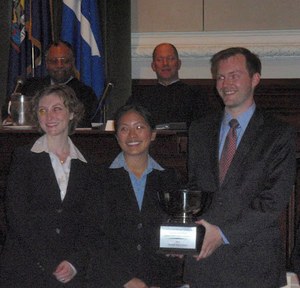
By Andrew Cohen
Two Berkeley Law teams finished in a heart-thumping second place besting hundreds of competitors at major advocacy competitions this winter.
Grace Yang ’12, Sean McTigue ’12, and Rachel Schwartz ’13 reached the final argument of the National Moot Court Competition—the country’s most prestigious moot court event—with 191 teams participating. Yang won the best individual speaker award in the championship round, which was held in New York City.
Just days earlier, Kristen Corpion ’13, Ciara Mittan ’13, Veliz Perez ’13, and Collin Tierney ’14 advanced to the finals of the American Bar Association Employment Law Trial Advocacy Competition. The ABA mock trial included 112 teams, with its championship round in Miami.
Alumnae Scotia Hicks ’07 coached Berkeley Law’s moot court team, and Carolyn Zabrycki ’08 coached the mock trial team. Both teams won their respective regional tournaments to advance to the finals.
Appellate Program Director William Fernholz ’93 praised team members for “honing their arguments and examinations to a razor-sharp edge” and called their achievement “a reward for lots of very hard work.” Fernholz said the Professional Skills Program “tries to give our students the tools to not merely survive, but also thrive in the practice of law. Successes like this show we’re on the right track.”
The fictional moot court case involved Andrea and Brandon, the top two students in a high-school class. On a blog, Andrea accused Brandon of cheating. The vice principal suspended Andrea, and told reporters that teachers had sent emails saying Andrea actually cheated. The emails were lost, however, when the vice principal deleted them to clear inbox space and the school’s backup server failed.
The first issue was whether the school could regulate Andrea’s speech, which happened outside the school, but had an impact on its students. The second was whether a judge could instruct the jury to infer that the deleted emails would not be a valid reason to make a statement to the press. Could an “adverse inference” jury instruction be based on an act—deleting the emails—that was negligent but not in bad faith?
Attacking the Issues
McTigue and Yang, both of whom competed in moot court events last year, split the more nuanced 1st Amendment issues. Schwartz argued both sides of the adverse inference issue.
“Competing last year revealed the amount of preparation needed to succeed,” McTigue said. “There’s a thin line between good and great, and the difference is continuing to practice even when you feel like you pretty much have it down, Something that seems marginal when thinking about it in the abstract can play a big part in the competition.”
Yang admittedly came to law school “without knowing what appellate advocacy looked like.” But a positive experience in her first-year Written and Oral Advocacy course—capped by arguing a mock trial-court motion at the U.S. 9th Circuit Court of Appeals—pushed her to pursue moot court the past two years.
“It’s a rewarding process,” Yang said. “Scotia Hicks was tremendously helpful in getting us ready this year, and the advocacy program’s student directors were really organized in structuring our practices. That made for a very smooth operation.”
The team’s four-day championship round in New York capped more than four and a half months of intense preparation. After receiving the case facts, McTigue, Yang, and Schwartz had a month to write their brief, a month to practice for the regionals in November, and a month after final exams to prepare for the championship round.
“We practiced three or four times a week in January,” Schwartz said. “Arguing both sides of the adverse inference issue was confusing at first, but it got easier over time, and we all had a great experience. It’s a time-crunch, but definitely worth it.”